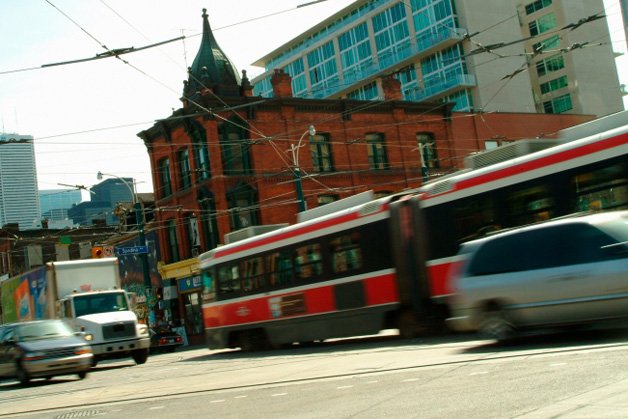
Mayoral candidates are lining up to weigh in on an ambitious TTC report about improving transit service, suggesting that the document has, at least temporarily, succeeded in shifting the conversation about how to make public transportation in our gridlocked city better.
This term of council has seen protracted debates over new LRT and subway lines whose timetables for completion range from seven to 20 years, while the state of the existing system has taken a back seat.
The report refocuses the discussion on the TTC’s unglamourous but vitally important bus and streetcar routes, and makes nine short- and medium-term recommendations to improve them. The recommendations include implementing all-door boarding on all streetcars, switching to a two-hour time-based fare system, creating a network of 10-minute-or-less bus service, and adding vehicles to reduce wait times and crowding.
Toronto transit advocate Steve Munro hailed the report on his blog, writing: “This report is a long-overdue overview of what Toronto’s transit system could be.” Instead of yet another exercise in “drawing rapid transit lines on maps,” he wrote, it represents “advocacy for the riders who are here today.”
It’s also a departure from the current administration’s TTC policy. In 2012, crowding standards were reduced and service was cut to meet Mayor Rob Ford’s direction to slash the agency’s budget by 10 per cent. The report notes that those cuts undid much of the success of the Ridership Growth Strategy, introduced in 2003, and ridership has begun to suffer as a result.
At current service levels the TTC is approaching “peak capacity,” according to the report. There’s a limit to how many more passengers can be squeezed onto the current service and unless improvements are made to the existing system, ridership will start to level off. That means more people driving, and more gridlock, as the city continues to grow.
TTC CEO Andy Byford denies that the timing of the report, which he will present at the final meeting of the TTC board on Tuesday, is indication that it’s meant as a repudiation of transit policy over the last four years. But he allows that the goal of the proposal is to “get back onto a trajectory of continuous improvement such that we make public transit both more effective and more attractive so that people use it.”
Byford is adamant the report’s sweeping recommendations are not a wish list but a practical proposal. “This is a suite of improvements that we believe could and should be taken if the funding is available,” he says. “My pitch is: are we serious about improving transit or not? Because if we are serious about it then funding needs to be found.”
That funding, while less than the billions of dollars needed for projects like the Scarborough subway extension, would still be considerable. The expected cost of the all the recommendations is $288 million in capital funding over four years, and $16 million in operating funding in 2015 ramping up to $69 million annually by 2018.
Unfortunately, no matter who wins the mayoral election, the next administration may not have the political will to come up with that money. None of the leading mayoral candidates was willing to fully embrace the report on Monday.
Olivia Chow crowed that the document was proof the TTC agreed with her perviously announced campaign promise to increase rush-hour bus service by 10 per cent, at a cost of $15 million. Asked in an interview which other aspects of the report she could get behind, she says, with a laugh, “the ones that don’t cost any money.” Those include the all-door streetcar boarding proposal, which the TTC says would cost at most $3 million, and might even break even.
Chow says the time-based transfer system, which transit advocates have long lobbied for, is “not a bad idea” but only “if we can afford it.”
Although Ford presided over service cuts this term, he told reporters Monday that he agreed with “most of the recommendations” in the report, with the exception of the time-based transfers and the all-door boarding system, the latter of which he predicted would be ineffective and lead to fare evasion.
The anti-tax mayor rejected any property tax or fare increase to pay for the proposals, arguing that there “obviously there are savings to be found at the TTC.” Byford says that there is no more fat to trim from the agency’s budget however, and even if there were, it would not be enough to fund the proposed service increases.
The frontrunner in the mayor’s race had the least enthusiastic response. A press release from John Tory slammed the report, saying it “lacks any semblance of a financial plan.”
“Coming up with a program involving hundreds of millions of new spending in the middle of the fiscal year, ten weeks from an election, is just bad planning,” Tory said, plugging his own plan for a SmartTrack rail system.
But TTC Chair Maria Augimeri defends the timing of the report, saying it’s not the board’s intent to seek council’s final funding approval for before the October 27 election.
“It’s to provide the next administration with all the tools that they need to make judgments, make decisions,” she says. “If we’re really committed to improving transit, we need the information at our disposal.”
bens@nowtoronto.com | @BenSpurr












